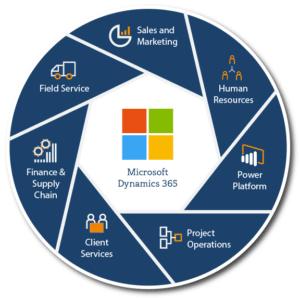Microsoft Dynamics 365 – The Unified Platform
We go over Dynamics 365 as your unified platform solution for all your business needs. We cover everything from PowerBI to the Cloud and more
Table of Content
Unless you’ve been working with it recently, you’re going to find out, as you read on, that Microsoft Dynamics 365 is way more than you thought it was.
Most people first became aware of Microsoft Dynamics when Microsoft first acquired a series of enterprise resource planning (ERP) software companies using them to deliver four ERP products that would run on servers located on the customer’s premises. Each version was ideal for a specific market segment.
More recently and in close alignment with the drive to Office 365, now Microsoft 365, and the Azure cloud platform, Microsoft improved upon all four on-premises products to create two comprehensive ERP platforms that are delivered as software-as-a-service (SaaS) from the cloud. Microsoft Dynamics 365 Business Central (BC) is ideal for the small to medium sized business, and Microsoft Dynamics 365 Finance & Operations (F&O) is designed for enterprise use.
Each of these platforms is a complete business process management software system that manages and integrates a company’s financials, supply chain, operations, commerce, reporting, manufacturing, human resource, and other activities. We’ll focus more on each of these later in this paper.
Along with these two ERP platforms, Microsoft also transitioned their customer relationship management (CRM) to the cloud as Microsoft Dynamics 365 Customer Engagement. This platform is easily extensible to manage all the stages of a customer relationship, including Marketing, Sales, Customer Service, Field Service and Project Service Automation.
Moving the Microsoft Dynamics 365 family to the cloud removed the burden of operating computer services from the customers themselves and put it in the best possible hands, those of Microsoft’s own experts.

Unlike most financial & operations software, Dynamics 365 goes well beyond day-to-day operations supporting extensive planning for future growth and then accommodating that growth with expansion capabilities that keep up with it.
It wouldn’t be Microsoft if they didn’t also provide an extensive ability to adapt these platforms to specific business requirements in the form of programming tools that most users can master quickly, putting the power of programming into people’s hands without need to learn how to “code.” With these, anyone who understands their own processes can develop highly useful applications to run with Dynamics that are “low-code/no-code” easily constructed using what Microsoft dubbed The Power Platform, which includes:
Data used by all these tools is conveniently stored, secured, and managed in the Dataverse, a singular repository through which all applications developed in the Power Platform may be shared. Data is integrated and disambiguated using the common data model, an open-sourced definition of modular and extensible business entities with semantic metadata that simplify the challenges of application development and data integration.
Microsoft AppSource provides thousands of ISV-developed add-on solutions to Dynamics 365, ensuring your ability to easily customize the solution to your specific vertical industry or business needs.

Beyond removing the burden of basic computer operations from the customer, the most important advantage that comes from cloud-delivery of the entire ecosystem is agility.
These cloud-based Microsoft products are not purchased, Instead, the customer simply subscribes to them. Various configurations of each service are available to better suit specific individuals in specific roles, and each subscription includes a specific rate based on a specific period of time commitment. The pain and frustration of evaluating and applying updates, fixes, and patches constantly is removed, as Dynamics 365 and Microsoft 365 users always receive whatever is necessary to keep them completely up-to-date on the most current versions of everything.
At any point in time, customers may choose to expand their services, reduce them, adjust them to suit changes in their business, or decide to end using them altogether. No longer are IT managers and their superiors trapped by their own investments. Customers choose to stay with their Microsoft platforms because they perform so well, so consistently, and offer such agility to adjust to any circumstance.
You don’t have to do this alone. Learn how Velosio can help you achieve your organizations goals as an ISV Partner.
Talk to us about how Velosio can help you realize business value faster with end-to-end solutions and cloud services.
"*" indicates required fields